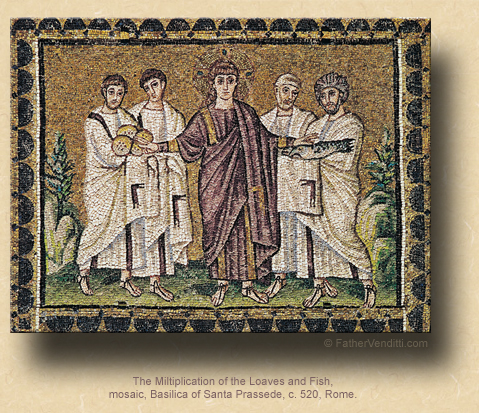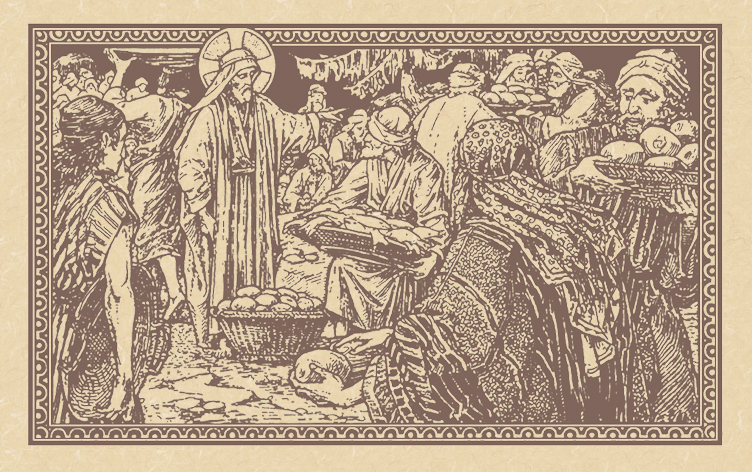With God, All Things Are Possible.
The Fifth Saturday of Ordinary Time; or, the Saturday Memorial of the Blessed Virgin Mary.
Lessons from the primary feria, according to the ordinary form of the Roman Rite:
• Genesis 3: 9-24.
• Psalm 90: 2-6, 12-13.
• Mark 8: 1-10.
|
When a Mass for the memorial is taken, lessons from the feria as above, or any lessons from the common of the Blessed Virgin Mary.
|
The Fourth Class Feria of the Blessed Virgin Mary on Saturday.
Lessons from the common "Salve, sancta Parens…" of the Blessed Virgin, according to the extraordinary form of the Roman Rite:
• Ecclesiasticus 24: 23-31.
[or 24: 14-16.]
• [Gradual] Benedicta et venerábilis es…*
• Luke 11: 27-28.
FatherVenditti.com
|
 7:08 AM 2/16/2019 — It’s painfully obvious that this event of feeding a hillside full of people with seven loaves of bread and a few fish has little to do with hunger or magic tricks as it does with feeding the world with the Body and Blood of Christ. 7:08 AM 2/16/2019 — It’s painfully obvious that this event of feeding a hillside full of people with seven loaves of bread and a few fish has little to do with hunger or magic tricks as it does with feeding the world with the Body and Blood of Christ.
And there is the symbolism of the Holy Eucharist all over this passage. For example, this passage occurs directly after yesterdays Gospel lesson in which our Lord heals someone. Why? Because in order to receive Holy Communion one must be free from sin.
In Matthew’s account, when our Lord commands the disciples to feed the people with the meager supplies on hand, they complain that it won’t be enough; but our Lord presses them on, reminding them that what they are going to accomplish will be done by His power, not their own … just like a priest does at the altar: he doesn't change bread and wine into our Blessed Lord's Body and Blood; Christ does it working through him.
Then after He breaks the bread, He gives the bread and fish to the disciples to distribute to the people; He doesn’t distribute it Himself. That’s because Christ entrusts the Holy Eucharist to His Church, particularly His priests, without whom there could be no Eucharist.
Then Saint Matthew goes on to tell us that they all ate and were satisfied. Of course they were, because the Body and Blood of the Lord is not food in the conventional sense, but spiritual food, the actual life of the risen Savior. No ordinary food could satisfy that completely. And it wasn’t just some who were satisfied, nor even most: the Evangelist says that all were satisfied, because the Eucharist is the remedy for all sin, for all people.
And when it was all over, they took up seven baskets of leftovers, in much the same way that we keep “leftover” hosts of the Blessed Eucharist in our tabernacles in church. And the baskets are left over because the Eucharist, once we partake of it, cannot remain dormant within us, but must be carried with us into the world, so that the life of Christ which we receive can be shared with everybody.
 And when the baskets are collected, Jesus and His disciples get back into their boat and move on, because the grace of the Eucharist must be spread to everyone. No one can attain heaven without it, as our Lord Himself said in Chapter Six of John’s Gospel, "…you can have no life in yourselves, unless you eat the flesh of the Son of Man, and drink his blood" (6: 54 Knox). And when the baskets are collected, Jesus and His disciples get back into their boat and move on, because the grace of the Eucharist must be spread to everyone. No one can attain heaven without it, as our Lord Himself said in Chapter Six of John’s Gospel, "…you can have no life in yourselves, unless you eat the flesh of the Son of Man, and drink his blood" (6: 54 Knox).
Of course, our Lord’s disciples were not thinking of these things when our Lord performed this miracle;—and He did it twice—they were probably thinking, “Gee, what a great trick. Wish I could do a trick like that.” Whether they remembered it on the night of the Last Supper we’ll never know. But they certainly remembered it later, and so did the Fathers of the Church. Saint Jerome, in the fourth century, wrote,
The Apostles had not yet received the power to consecrate and distribute the Bread of Heaven, the Eucharist; yet Jesus, with a symbolic act, to nourish the hungry crowd, did not create new food, but took that which was in the hands of His disciples, and blessed it.
It explains a great deal about the Holy Priesthood and the sacraments: the priest is necessary to perform the mysteries, but it’s the power of Christ that makes them happen. And even in our own individual lives, everything we do that’s good is done by the grace of God acting through us.
That being said, it is a fact that our Lord does not supply all of this miracle Himself: He still chooses to require the raw materials from us, just as he used the loaves and fish, meager and insufficient as they were, to feed the multitude; which surely points to the fact that grace is not completely a gift, but relies on our own efforts to make it work within us. And when we are open to receiving that grace, we can do what we were tempted to think was impossible: resisting any temptation and shouldering any cross that may come our way. What makes that possible is the grace of Christ, who said, "With God, all things are possible."

* The Gradual is non-Scriptural: "Blessed and venerable art Thou, O Virgin Mary: Who without blemish to Thy maidenhood, wert found to be the Mother of the Saviour. O Virgin, Mother of God, He Whom the whole world cannot contain, enclosed Himself in Thy womb and became Man."
|

